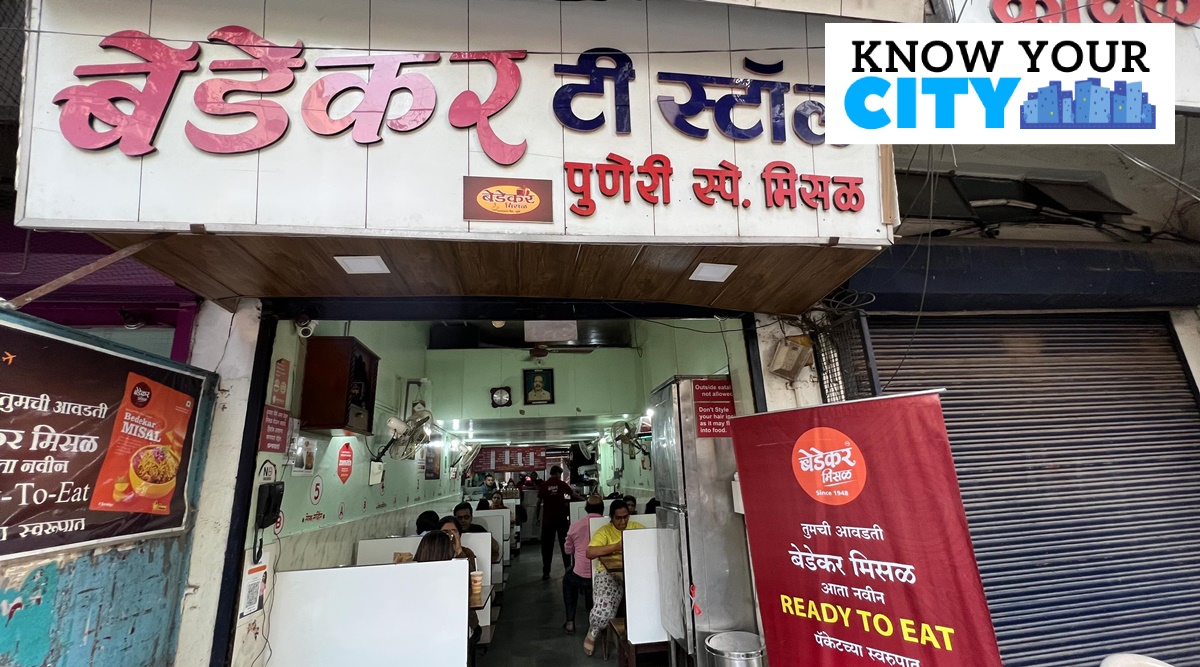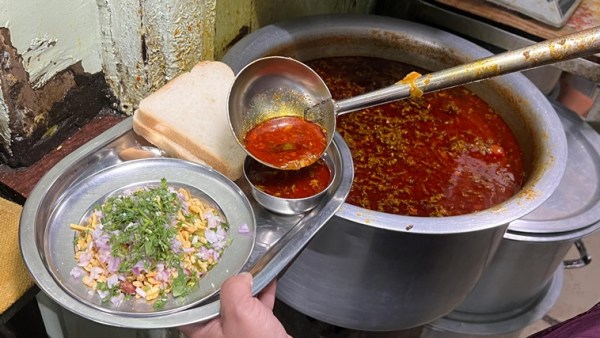 Bedekar missal in Narayanpeth. Express photograph by Arul Horizon.
Bedekar missal in Narayanpeth. Express photograph by Arul Horizon. On October 30, 2016, classical flute maestro Pandit Hariprasad Chaurasia, who was visiting Pune, was served a plate of Bedekar’s misal from Narayan Peth. After the meal, he wrote a letter to the owners: “Aapke misal ka misaal nahin hain. (There is no comparison with your misal).” If the plateful of misal struck a chord with the musician, it was because Bedekar Tea Stall in Narayan Peth is the birthplace of one of the original flavours of the Puneri misal. The restaurant has been serving the dish since the 1950s, using a recipe that is closely guarded by the family.
Every morning, brothers Anil and Alhad Bedekar, the third-generation owners, and their children come to the restaurant, weigh ingredients, pickles, and spices, and cook almost 500 kg of misal and gravy – a lot more on weekends — while the chef preps the vegetables. Anil’s wife Aparna and Alhad’s wife Nileema are present on alternate weeks. “We have kept the taste the way it was when my grandmother, Sushma Bedekar, used to make the misal ingredients,” says Tanvi Bedekar Bhuskute, who represents the fourth generation with her brother Aditya Bedekar.
Humble origins
Bedekar Tea Stall was started in 1948 by Dattatreya Bedekar to sell tea and pakoras near Narayan Peth Police Station. It could seat five people in a space that included the kitchen. Dattatreya belonged to Ayani Mete, a small village in the Western Ghats where mango and cashew trees grow in abundance and agriculture is the main source of livelihood. He moved to Mahad, where he ran a small lunch place, before shifting to Pune. The tea stall did moderately well. The women, i.e., Dattatreya’s wife Laxmibai and his daughter-in-law Sushma, fried pakoras at home, delivered these piping hot to the shop and returned to make more batches, delivering these until the last customer had left. Bedekar Tea Stall was started in 1948 by Dattatreya Bedekar to sell tea and pakoras near Narayan Peth Police Station. Misal was introduced at the restaurant by Dattatreya’s son Damodar, also known as Anna.
 Misal was introduced at the restaurant by Dattatreya’s son Damodar, also known as Anna. Express photograph by Arul Horizon. 04/03/2023, Pune
Misal was introduced at the restaurant by Dattatreya’s son Damodar, also known as Anna. Express photograph by Arul Horizon. 04/03/2023, Pune Pune has several versions of misal, depending on where it is from. The 110-year-old Vaidya Upahar Gruha in Ravivar Peth is considered one of the oldest restaurants serving misal in the city. The curry here is green due to fresh green chillies. Shrikrishna Bhuvan in Tulshibaug was started in the 1940s and serves misal with a coconut base. Bedekar came next and added a fresh twist to the flavours in the city. “Our gravy was inspired by the Amti that was cooked at home. There is jaggery, which is good for health. The taste of the curry is, thus, tangy, with a sweet undertone,” says Tanvi.
Bedekar’s misal received a lukewarm response initially — until the Panshet Dam disaster in 1961 brought in large numbers of workers into the city to repair and rebuild. They discovered Bedekar’s misal and began to spread the word at construction sites and camps. Suddenly, the five-seater restaurant seemed too small. In 1981, the family moved the restaurant to its present location. It could seat more than 30 at a time and seemed a large establishment when it was inaugurated. Misal was served only until lunch. The other dishes were namkeen and pakoras but these started getting phased out as the popularity of the misal grew.
Changing times
Today, the shutters go up at 7.30 am. People coming in for misal walk past the rows of tables to the end of the restaurant where plates of shev, chiwda of beaten rice, matki sabji and potato sabji, topped with onion and coriander, are set out with two slices of bread. Customers pick up a plate and walk back to their seats. A server will come and pour the gravy on the mixture and a small bowl at the side, and the meal can start. Lemon wedges are present in a covered bowl at the table. Many older eateries, such as Bedekar, still offer bread with misal because pav began to be served only in the 1970s. A plate of misal at Bedekar costs Rs 90.
On a Tuesday morning, the clients are mainly men in formals from the nearby offices, workers at the local shops and family and friend groups that are trying to fit into seating meant for four. The neighbourhood, which was once residential, has grown into a commercial hub. Misal is served throughout the day. On Sundays, there are regulars at the shop, some of whom come long distances.
 The restaurant has upheld the personal touch with customers. The fourth generation has taken its place at the gate to interact with guests. Express photograph by Arul Horizon.
The restaurant has upheld the personal touch with customers. The fourth generation has taken its place at the gate to interact with guests. Express photograph by Arul Horizon. “It is a tough balancing act to keep up with the changing times where food is consumed differently, and yet stay true to our formidable legacy,” adds Tanvi. Damodar was a quiet person who used to read late into the night. His idea of running a restaurant was an extension of his sense of hospitality. At Bedekar, one could take unlimited curry and sliced onions for free. According to the family legend, Damodar used to be present at the entrance to welcome visitors. “He would stand leaning forward, hands at the top of the shutter and one leg in front of the other,” says Tanvi.
The restaurant has upheld the personal touch with customers. The fourth generation has taken its place at the gate to interact with guests. On the other hand, the owners have started charging for the extra servings — which came in for a backlash on social media. “We were facing a problem of wastage. People would take extra helpings but not finish it. An extra bowl of curry costs Rs 25, an extra bowl of onion comes for Rs 5 and every extra slice of bread is Rs 5. The aim was not to earn an extra buck but to respect food because we work very hard to make it every day,” says Tanvi.
The restaurant has survived recessions, the coming of fast food after liberalisation, and being closed for 18 months in 1997 after a conflict with unions. Its strength is the ability to change as well as remain the same. For instance, Bedekar promotes locally grown and sourced food. There are no colas on its shelves but Sol Kadhi and Kokam Sarbat to drink. Tea and coffee are popular. There are three types of laddoos — garden cress seeds or halim, groundnut and gulkand — that are made hygienically by local organisations.
Charting a new course
For the last five years, however, the family has been working to give a new direction to its flagship product. Bedekar’s Ready-to-Eat Misal packets were introduced around Diwali last year and sold out. “People who traditionally gifted sweets included a packet of misal this time,” says Tanvi. Each packet contains four servings of misal that one can make at home by pouring water into the mix. “We used to have people from abroad, especially the US, complaining that they could not get our misal there,” says Tanvi.
The Ready-to-Eat misal will be launched in retail outlets in Bengaluru in mid-March before it is supplied across the country and overseas. “We are also looking for franchisees because it is too big a brand to restrict to one restaurant. But, we will never change the original flavour of the misal,” says Tanvi.